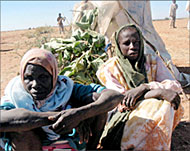Annan: No forced return for Darfur displaced
UN Secretary-General Kofi Annan has assured displaced people in Sudan’s troubled west on that no one would force them to return home without guarantees of protection.

Annan on Thursday sat on the ground in a circle with African women who fled their homes from the militias, known as Janjaweed, and listened quietly as the women, swathed in brightly coloured wraps, told him why they could not return to their villages.
“I agree with you and I am in discussions with the Sudanese
government to make sure there is security so that you can go home. Nobody is going to force you to go home without security,” said Annan, visibly touched.
After years of conflict in Darfur between nomadic tribes and African farmers, two groups rebelled last year, accusing Khartoum of arming the Janjaweed, which the government denies.
The United Nations says two million have been caught up in the fighting, creating the world’s worst humanitarian crisis.
Rights groups and US officials say the Janjaweed are carrying out a campaign of ethnic cleansing in remote Darfur, which borders Chad. Khartoum says the Janjaweed are outlaws and it has promised to try to disarm them.
Talks with rebels
Sudanese Interior Minister Abd al-Rahim Muhammad Hussain said political talks with the rebels would start in Chad on Friday.
 |
|
One million Darfuris have fled |
“Our negotiation team comprising the state ministers for foreign affairs … and the state minister for humanitarian affairs … has left for N’Jammena with Kofi Annan to start political negotiations,” he told Reuters.
Darfuris in the Zam Zam camp, about 17km south of al-Fashar, the capital of Northern Darfur state, said they were ashamed to be there, but were afraid they would starve if they went home at this stage in the farming year.
“It is the war that drove us here. It hurts my pride to be here,” said Hasan Adam Sulaiman. “This rainy season is gone so we cannot plant. Next year we know we will starve.”
US Secretary of State Colin Powell said during a visit to Sudan on Wednesday the UN Security Council might pass a resolution on Darfur if Sudan does not disarm the militias and allow full access to humanitarian agencies.
The United States has circulated a draft resolution which imposes an arms embargo and travel ban on the Janjaweed but does not take action against the Sudanese government itself.
‘Logistical nightmare’
Sudanese Foreign Minister Mustafa Usman Ismail assured
Powell that Sudan was working to achieve security in Darfur and would speed up negotiations with the rebels.
|
“We have to admit that we are late in Darfur. The parties fought too long before reaching a ceasefire agreement” Jan Egeland, |
UN Emergency Relief Coordinator Jan Egeland told reporters on Thursday the United Nations was slow to act in Darfur, where aid workers say about 350,000 people could die this year of disease or malnutrition, especially with the onset of the rainy season. He also blamed Khartoum for inaction.
“It is one of the biggest logistical nightmares in the history of humanitarian assistance,” he said, referring to aid operations in Darfur, an area the size of France but with few roads and little infrastructure.
“We have to admit that we are late in Darfur. The parties fought too long before reaching a ceasefire agreement,” he said.
Blocking aid
Khartoum blocked aid access for almost two months after the ceasefire with the rebels in April, he added.
“We’ve doubled our presence in Darfur over the last five weeks and we will double again in the next five weeks, but we still need to triple it,” he said.
The rainy season makes roads almost impassable, increases the threat of malaria and helps disease spread in the camps.
Annan had planned to visit one of Darfur’s worst camps, in a
deserted plant nursery in the centre of al-Fasher, but found on arrival that the camp, full of stagnant puddles and dead donkeys, had been cleared of people in the last 24 hours. Aid workers said this was clearly because of Annan’s visit.